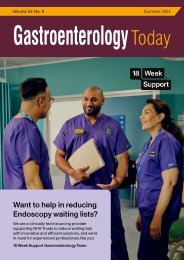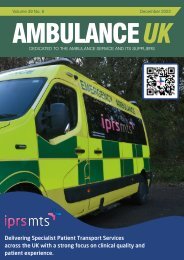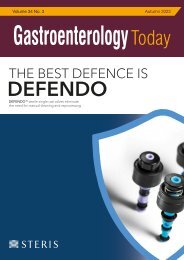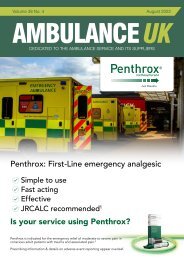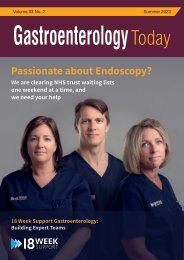Gastroenterology Today Autumn 2020
You also want an ePaper? Increase the reach of your titles
YUMPU automatically turns print PDFs into web optimized ePapers that Google loves.
NEWS<br />
Simpler diagnostic process<br />
for adults with suspected<br />
coeliac disease could<br />
reduce NHS waiting lists and<br />
improve patient health faster<br />
The British Society of <strong>Gastroenterology</strong><br />
(BSG) has issued interim guidance,<br />
pending the publication of its new Coeliac<br />
Guidelines in 2021, so that some adults<br />
with suspected coeliac disease can now<br />
be diagnosed based on blood test results<br />
alone, cutting out the long wait for an<br />
endoscopy with biopsy.<br />
Diagnosis of coeliac disease in adults is usually<br />
a two-step process, a blood test to look for<br />
antibodies followed by an endoscopy with<br />
biopsy to look for damage to the intestine.<br />
Early in the coronavirus pandemic, the<br />
BSG recommended that non-emergency<br />
endoscopies should be paused to protect<br />
NHS staff and patients from coronavirus<br />
transmission. This meant that many people with<br />
suspected coeliac disease have been unable to<br />
have an endoscopy as part of their diagnosis.<br />
Hilary Croft, Chief Executive of Coeliac UK<br />
said: “Coeliac UK has previously called for<br />
the national guidelines to review the evidence<br />
for adult no-biopsy diagnosis and so fully<br />
supports the BSG’s new position. This will<br />
enable a greater number of people to gain<br />
a faster diagnosis, without the need to wait<br />
for an endoscopy at the hospital. Getting an<br />
accurate diagnosis of coeliac disease means<br />
keeping gluten in the diet throughout the<br />
testing process - a difficult feat when waiting<br />
lists are long and people feel unwell.”<br />
The interim guidance published due to the<br />
impact of Covid-19 on endoscopy waiting<br />
lists, suggests that a no-biopsy diagnosis can<br />
be used for adults under 55 years of age with<br />
symptoms of coeliac disease who:<br />
• Don’t need an endoscopy to rule out other<br />
conditions<br />
• Have antibody levels (IgA tissue<br />
transglutaminase) at least 10 times the<br />
upper limit of normal<br />
• Have a second positive antibody blood test<br />
(endomysial antibodies (EMA) or tissue<br />
transglutaminase if EMA isn’t available)<br />
A GP can request the initial antibody blood test<br />
but the decision about whether an endoscopy<br />
and biopsy is needed, and the final diagnosis<br />
of coeliac disease, should be made by a<br />
gastroenterologist. The impact of this new<br />
diagnosis pathway will be closely monitored, and<br />
data is being collected to assess the impact of<br />
this new approach for adults. For children, since<br />
2013, guidelines have recommend a no-biopsy<br />
diagnosis for some children.<br />
“These guidelines are good news for those<br />
who meet the criteria for a no-biopsy diagnosis<br />
who will be able to start to feel better sooner<br />
on a gluten free diet, the only treatment for<br />
coeliac disease. However, those that do not<br />
meet the criteria for no-biopsy diagnosis are<br />
likely to face long waiting times as endoscopy<br />
services begin a phased return. Access to<br />
blood tests may still be limited at the moment,<br />
so we encourage people to speak with their<br />
GP for more information about diagnosis<br />
of coeliac disease if they are experiencing<br />
symptoms,” continued Ms Croft.<br />
Coeliac disease is not an allergy or an<br />
intolerance but an autoimmune disease where<br />
the body’s immune system damages the lining<br />
of the small bowel when gluten, a protein<br />
(found in wheat, barley and rye) is eaten.<br />
There is no cure and no medication; the only<br />
treatment is a strict gluten free diet for life. 1<br />
in 100 people in the UK has coeliac disease<br />
but only 30% of those with the condition have<br />
been diagnosed. There are an estimated<br />
half a million people in the UK who have the<br />
condition yet don’t know it.<br />
There is a wide range of symptoms associated<br />
with coeliac disease. Some symptoms may be<br />
confused with irritable bowel syndrome (IBS)<br />
or wheat intolerance, while others may be put<br />
down to stress or getting older.<br />
To make it easier to understand if symptoms<br />
are possibly due to coeliac disease and<br />
discuss further testing with your GP, Coeliac<br />
UK has developed a self assessment test<br />
to make it easier to take that first step to<br />
diagnosis.<br />
Go to www.isitcoeliacdisease.org.uk to take<br />
the online assessment.<br />
WHY NOT WRITE FOR US?<br />
GASTROENTEROLOGY TODAY - AUTUMN <strong>2020</strong><br />
<strong>Gastroenterology</strong> <strong>Today</strong> welcomes the submission of<br />
clinical papers and case reports or news that<br />
you feel will be of interest to your colleagues.<br />
Material submitted will be seen by those working within all<br />
UK gastroenterology departments and endoscopy units.<br />
All submissions should be forwarded to info@mediapublishingcompany.com<br />
16<br />
If you have any queries please contact the publisher Terry Gardner via:<br />
info@mediapublishingcompany.com




